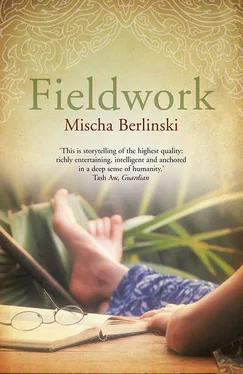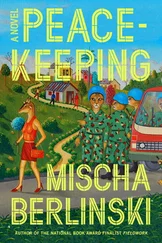Like all graduate students returned from fieldwork, Martiya was given the opportunity to lecture on her findings. There were exactly eighteen attendees for her lecture, entitled "The Ministry of Ghosts: Bureaucratic Form and Function in Dyalo Spiritual Life," and two of those attendees, Martiya well knew, went to every lecture, on account of the little buffet the department set up afterward, with takeout from the Chinese restaurant on Shattuck Avenue. A third was Karen. Even now, when Karen lectured on animism to her undergraduate students, she found herself using examples from that lecture. If Martiya had stuck with it, Karen said, she would have been a superstar.
No one who lived with the Dyalo, Martiya began, could fail to note the very frequent references in Dyalo conversation to the things called tsi . The word meant, more or less, "spirits" in English, but the word had a somewhat greater range of meaning in Dyalo: in certain contexts, the word meant "god," as when the Dyalo spoke of Wu-pa-sha tsi , the creator of the wind, water, rain, and thunder, while in other contexts, the word had a strictly technical sense, as when the Dyalo spoke of someone afflicted with " wu-neu tsi ," or a headache.* All of the various tsi were invisible to the Dyalo, at least with the eyes, but nevertheless were absolutely real to the people of Dan Loi. To deny the existence of the tsi was to deny one of the most basic aspects of the natural world. Not long after she arrived in the village, Martiya asked how many tsi there were in the world. "There are as many tsi in the world as clouds in the sky or grains of rice in the fields," was the response: the tsi were uncountable, and the question made as little sense to the Dyalo as the question, "How many bacteria are there in this room?" Lots.
Martiya was very small behind the podium, but she spoke with a wonderful authority.
Martiya continued: Some of the tsi were associated with places, like the tsi who dominated the mountain on which Dan Loi was situated, the tsi who ruled the village, and the tsi who lived on the big rock behind the village. Almost every place had its own proprietary tsi . Other tsi were as-
*And then there was the usage invented by the Walkers to describe their God: Ye-su-tsi.
sociated with natural phenomena like thunder or rain; and still other tsi with biological entities, like rice, trees, various animals, and even human beings. The tsi associated with human beings the Dyalo called ts'aw-wo —a word which Martiya translated as "souls," and such tsi might be associated with men and women both living and dead. The latter category is what the occidental refers to as a ghost.
One of the consequences and fundamental underpinnings of the Dyalo spiritual system was the odd and provocative idea that, to the Dyalo, there were no accidents .
Martiya's thinking on these matters was substantially influenced by a rereading of the great English ethnographer E. E. Evans-Pritchard and his studies of witchcraft among the Azande of the Sudan. The peculiarity of Azande thinking, Evans-Pritchard argued, was that, like the Dyalo, the Azande had no notion of bad luck; rather, they ascribed all ill fortune to witchcraft, from the most trivial, a stubbed toe, to the most grave, a sulky wife or death. Whatever went wrong, went wrong because a witch had cursed the action. The Dyalo were not great believers in witchcraft — although witches did exist among the Dyalo — but the Dyalo, like the Azande, were unable to admit the possibility of accident, simple bad luck. Indeed, there was no word for "luck" in Dyalo. If an otherwise inexplicable bad thing happened, it happened almost always because a spirit was angry; if a spirit was angry, it was because somebody had angered a spirit.
Things that to the occidental mind were clearly bad fortune or happenstance, the Dyalo automatically interpreted within a chain of spiritual cause and effect. In Martiya's village, a young woman stumbled and fell into a cooking fire, burning herself badly. A man in the village raised pigs; a pig wandered off into the forest and was lost. A village woman, an expert weaver, produced a garment that snagged on a branch and unraveled. In all three cases, what Martiya would have called bad luck, or misfortune, the Dyalo called the work of the spirits. Why did a young woman known for her grace stumble at precisely that spot and fall into the fire? To fall at another spot would have been benign. A spirit seized her and pushed her. Hundreds of pigs were raised in the village; every now and then a pig would be lost in the forest. But they were almost always found again. Why not this one? A venturesome spirit took the pig's soul. The weaver was a woman of the highest skill. Her garments from twenty years ago were still in use. Why not this one? She had been distracted by a spirit. The young woman who stumbled was thought to have angered the fire spirit by eating corn near the fire pit. The owner of the pig erred by allowing the pig to wander in the vicinity of the Old Grandfather shrine: it was inevitable that something would go wrong. The weaver's mother had been careless, failing to present the household spirits with their breakfast.
"Think about this for a minute! Just think!" Martiya said. "If you think that everything that goes wrong in the world is caused by some bad spirit — and if you think these bad spirits are all around you — think how nervous you'd be all the time. You can ask the spirits to do this or that, but you can never be sure that they'll listen. Think how different your mental world would be if you thought that even moving a rock in your taro patch could anger the spirit who might make your taro come in badly, or give your daughter an incurable illness, or just put your wife in a really bad mood for a month. The fact that the Dyalo live in this world, surrounded by invisible enemies everywhere — and they do it with so much good humor and such grace — they're the bravest people I know."
Karen recalled the quiet that came over the room when Martiya was done speaking. Then a woman in the audience raised her hand. It was clear from her straggly appearance that she was a Berkeley resident rather than a member of the department, and this woman explained that she had come to the lecture attracted by the word "spiritual" on the flyer. She asked Martiya how her time with the Dyalo had affected her personal spiritual practice.
"My personal spiritual practice?"
"Yes, how you relate personally to the Goddess and other spirits."
Martiya thought about the question a moment, and then said, "I learned that I liked to slit the pig's throat and watch him bleed."
The little woman blanched.
To Martiya's intense surprise and displeasure, the scholarly community of the University of California at Berkeley had not, in fact, been waiting with bated breath for the results of Martiya van der Leun's expedition to Dan Loi. The frustrating thing was not that this was a big blow to her ego — on the contrary: she was smart and sensitive enough to realize that anthropologists had come home from expeditions to the farthest corners of the globe every single week since Malinowski had come home from the Trobriands; and that another graduate student coming back was not grounds for a university-wide day of rejoicing and celebration. No, what really frustrated Martiya was that she still didn't understand the Dyalo, not at all, and all the time she was in Dan Loi, her Curiosity had been growing day by day, and she had imagined that when she got back to Berkeley she'd be able to put all her field notes out on the table with some really smart people, and she'd finally be able to figure out all the things about the Dyalo that she couldn't figure out in the field.
Читать дальше












